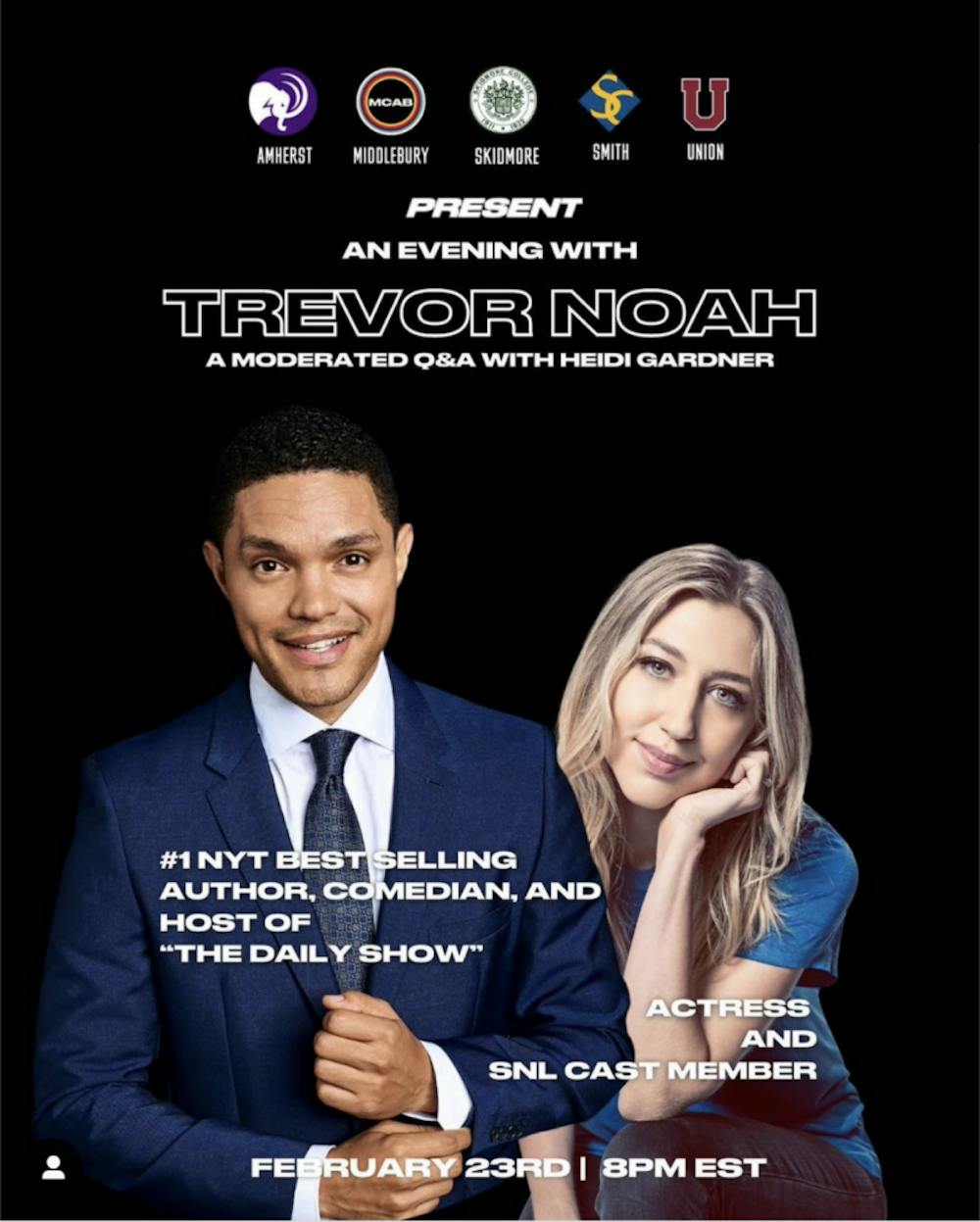Trevor Noah, host of “The Daily Show,” joined Middlebury, Smith, Union, Skidmore and Amherst colleges in a live-streamed interview on Feb. 23. Heidi Gardner, an actor and comedian for “Saturday Night Live,” moderated the event over Zoom.
While the evening included plenty of jokes and discussion of lighter topics (when it comes to favorite ice cream flavors, Noah describes himself as a “dabbler”), many of the questions — all of which were submitted by students ahead of time — focused on sober subjects, such as the pandemic, personal accountability in the era of “cancel culture” and the relationship between politics and humor.
In answering questions about his role as a comedian whose primary source material is politics, Noah described comedy as a tool he uses to dissect current issues. His goal with “The Daily Show” is to provide viewers not just with subject matter that is fun to discuss and make light of, but also provide content about politics and current events that affect them personally. While this may sound like bitter medicine, Noah said his aim is to always include his audience in a genuine conversation with himself and his colleagues.
Noah’s response to people who “don’t do politics” was simple: “Yeah, well politics is going to do you.” He also noted that his role as the host of a comedic program like “The Daily Show” offers him the freedom to voice his own biases and opinions, though not without first stating the facts. Noah believes comedy to be an inherently honest medium because an audience only laughs if there is a truth involved, whether overt or implied by omission. He did note that some jokes about current events write themselves, describing Sen. Ted Cruz’s recent trip to Cancún, Mexico, during a natural disaster that left many of his constituents in Texas without power and water for days as “a gift that the Lord has presented to comedians.”
When asked what he thought about “cancel culture,” Noah laughed and said, “That’s a fun question.” He called the term a misnomer, and he differentiated between accountability and “loud people.” Noah noted that there is a broad range of what people term “cancelling,” and for the most part it’s simply people being held accountable by the public. He pointed to the power of social media to provide a voice to those who previously didn’t have a way of being heard, but also to the role platforms and algorithms play in amplifying the voices. Noah brought up the recent example of Morgan Wallen, the country star who was recorded on video using racial slurs. As the recording spread online, Wallen was widely deemed “canceled,” and many radio stations stopped playing his music. Despite the controversy (or perhaps because of it), sales and downloads of his songs skyrocketed and Wallen’s album is now number one on the Billboard 200. Noah questioned if canceling Wallen served its purpose, or if it simply brought him notoriety.
The virtual event was representative of some of the creative ways the Middlebury College Activities Board (MCAB) has been navigating the pandemic. According to MCAB Social Executive Karina Sharma ’22, the five colleges began planning the Q&A early last semester after Union College proposed a collaboration. The same promotional materials were used by all of the colleges and designed by MCAB Marketing Executive Paul Flores-Clavel ’22. In an email, Flores-Clavel noted the aesthetic challenge of satisfying not only all five schools, but Noah and Gardner’s teams as well. Student representatives collected and sorted questions submitted by their student bodies and made sure to submit an equal number from each college for consideration by Noah and Gardner’s respective teams.
Noah ended the 45-minute interview by extending a piece of advice: take advantage of being in a place designed for the sharing and learning of ideas by engaging with people from different walks of life. According to Noah, it is only through learning about others that we will be able to build a more nuanced view of the world.
Trevor Noah talks comedy and culture with Middlebury

Comments



